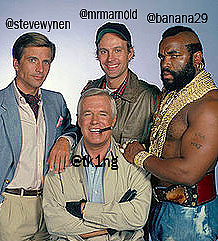Imagine you’re the head of the English department at a high school. Your job is to support the English teachers in your department, help develop consistent and meaningful curriculum, buy department supplies and act as your teachers’ voice at school directions team meetings. It’s one of the biggest departments in the school, you may have up to a dozen teachers, some teaching English full time and some part time, all of them with clear qualifications in their field. You have the benefit of all those varied opinions, but you also have to try and get them moving in roughly the same direction too. You’ve got your school’s library of novels and other texts to maintain, all the time knowing that every student in the school is going through your program which teaches vital literacy skills. Students cannot graduate without demonstrating those literacy skills. Your job isn’t an easy one, but its importance is self evident.
I am the head of computer studies at my high school. I’m a department of one, which makes developing consistent and meaningful curriculum for my subject area rather difficult (and lonely). I don’t have a collection of professionals to bounce ideas off. I have to maintain text books, and equipment, but for vanishingly few students – computers just aren’t on the must-take list at my school (there’s no future in them?).
There’s a twist to this headship though: when you’re the head of computers, you’re not just the head of a small, unimportant department, you’re also responsible for your subject area school-wide, and it’s a growing, vital piece of modern educational practice. Internet failures now begin to look a lot like power failures in the last century.
***
Imagine you’re that head of English again, except now you’re not just responsible for your department, but for English usage in the entire building.
Every time a student or teacher makes a grammar mistake or needs some reading material or writing stationary, you’re the one they turn to. You’ve got your department to run, but you’ve also got to oversee the execution of your discipline throughout the entire building. You spend your time correcting people’s reading, buying them pens and paper, and proofreading and correcting their mistakes.
They don’t hand this to you because they want to be illiterate, they do it because the school board wants to retain control of their stationary – which means its better to read and write everything for people than it is to let them learn how to become literate themselves; control is more important than learning.
The school population is capable of learning how to read and write, but remain illiterate because their employer finds that easier to manage. In that building of illiterate people, your ability to read and write raises you to otherworldly status, people seek you out to do the impossible and read the printed page.
This isn’t entirely without historical context. There was a time when reading and writing was a mystery of the learned class, a means of separating knowledge from the proles. Whole alphabets were conceived around the idea of making it more difficult for commoners to become literate, churches kept literacy from the masses. Knowledge is power and literacy is the key to knowledge.
I fear something similar is happening with computers now. There is little doubt that they are becoming intrinsic to the functioning of modern life, but a smaller and smaller group is able to grok computing. Overcoming intellectual barriers like this should be the primary directive of public education, yet we’re falling into the gap between the digerati and the rest.
***
It sounds ridiculous, but enforcing enforced ignorance is what I’m facing as the Computer Studies head. I have almost no time to actually nurture the anemic department I’ve inherited because I’m looking after the people who have been taught to be helpless by their employer. I spend most of my time managing the budget of school IT, ordering equipment and repairing or passing along problems to board tech support. My own department is an afterthought, the actual teaching of computers to students is an echo of what I experienced in the 1980s when we barely had any computers. My time is spent supporting a system that encourages ignorance, and it’s a system that is insinuating itself into education practice more completely every day.
This is a headship like no other.
I was thinking about this as I was doing my weekly ‘fair share’ of extra duties and covering the library so the librarian could go to lunch. I haven’t had an uninterrupted lunch since school began. I haven’t had an uninterrupted prep period since school began.
***
I’m feeling pretty down on the job, but it’s more a matter of appreciation for the work involved than it is the work itself. I genuinely enjoy technology. I’ve had my hands in computers since I was a child, it was one of my first serious hobbies. When people say things like, “computers are making people stupid” or, “computers are making people autistic” I get angry. Ignorance injures people, tools are only helpful in skilled hands, otherwise they can injure as easily as assist.
Computers are one of the most powerful tools we’ve invented, up there with harnessing electricity as a means of empowering us. How we teach computers directly influences how well we’re able to grasp a better future, I honestly believe this.
Watching the taught helplessness of the school computer lab makes me fear for that future. Just as we teach drivers the responsibility of operating an automobile, so we should be teaching both teachers and students how to grasp and manage the powerful computing tools we now have at our disposal. We all need to be responsible for the technology we wield.
Students (and educators, and education systems) who view computers as a distraction instead of an empowerment, who enforce simplistic, habitual use instead of exercising human/computer potential are more than a tragedy, they are the genuine threat that Nick Carr suggests.
It’s a tough situation, being trapped between what appears to be an increasingly vital skillset and an education system intent on not teaching it.
The frustration at not having your work recognized is one thing, but when that work only reinforces a system founded on spreading ignorance, the whole thing gets quite unbearable.
I hope one day we wake up and change how we use computers in schools. I guess my way forward is to keep pushing for what I think should be a self evident truth: if you don’t learn how to use the technology, the technology will learn how to use you.















